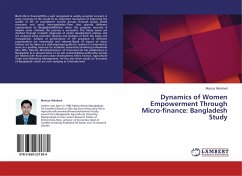Although empowerment has now become a familiar and much used term, an adequate and comprehensive definition remains elusive. One problem is that empowerment is a 'latent phenomenon' that is not directly observable: its aggregate results or effects may be visible but the internal dynamism is difficult to examine. Empowerment is also often seen only partially, as women's increased autonomy and freedom. However, empowerment also implies additional responsibility; responsibility which may not always lead to be welfare-enhancing outcomes. For example, women's greater mobility and visibility often leads to increased exposure to violence; women's increased role in decision-making may cause men to take less responsibility and even withdraw support for critical decisions like health care seeking. Thus, empowerment brings with it both rights and responsibilities, and may lead to some freedoms being curtailed.
Bitte wählen Sie Ihr Anliegen aus.
Rechnungen
Retourenschein anfordern
Bestellstatus
Storno








